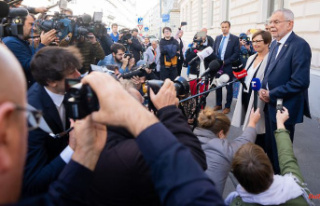In the state elections in Lower Saxony, Prime Minister Weil's SPD is once again the strongest force. According to projections, the Social Democrats are ahead of the CDU with their top candidate Althusmann, despite losses. The FDP must tremble to enter the state parliament. The only parties that are growing are the Greens and AfD.
In the state elections in Lower Saxony, Prime Minister Stephan Weil's SPD once again became the strongest party. According to the first projections from ARD and ZDF, the Social Democrats are ahead of the CDU with top candidate Bernd Althusmann, despite losses. At around 27.5 percent, the CDU recorded its worst state result in more than 60 years (2017: 33.6).
The Greens, on the other hand, almost doubled their votes and ended up in third place with 14 to 14.5 percent (2017: 8.7). The AfD is also gaining ground, reaching 11.5 to 12 percent (2017: 6.2). With 5 percent, the FDP must fear failing at the five percent hurdle (2017: 7.5). The left is likely to miss entering the state parliament again.
The last state election this year was primarily a mood test for the traffic light coalition in Berlin. The central topic was the energy crisis after the Russian invasion of Ukraine; national political issues hardly played a role.
Prime Minister Weil had said during the election campaign that in future he wanted to govern with the Greens and no longer with the CDU as before. CDU top candidate and Economics Minister Althusmann had shown himself open to a coalition with either the SPD, the Greens or a Jamaica alliance with the Greens and FDP.
The election in Lower Saxony was the fourth state election since the federal elections last year, after those in Saarland in March and in Schleswig-Holstein and North Rhine-Westphalia in May. In Saarland, the SPD made significant gains and now governs there alone, because the CDU lost heavily and the Greens and FDP made slight gains, but still failed at the five percent hurdle. In Schleswig-Holstein, the SPD and FDP collapsed, and a very strong CDU has ruled there with the Greens, which have also strengthened, since then without the Liberals. In North Rhine-Westphalia, on the other hand, the Greens in particular gained ground, the CDU won slightly, the SPD and, above all, the FDP lost. A black-green alliance now governs there as well, as in Kiel, the FDP was also thrown out of government in Düsseldorf. None of these elections went well for the FDP.
FDP Vice Wolfgang Kubicki justified his party's poor performance with the traffic light policy and the role of the FDP in it. A significant part of the FDP voters in Lower Saxony are still alienated by the traffic lights in Berlin and the role of the FDP, he said. You got off to a good start at the traffic lights, then Russia's attack on Ukraine happened. He mentioned energy supplies, inflation and concerns about whether the peace could be maintained. "In any case, there have been no reasonable answers to this so far. We will have to work on that or this traffic light will get into trouble." Personnel issues did not play a role after this election, said Kubicki.
CDU General Secretary Mario Czaja was disappointed. "It's not a nice result for us," he said. The CDU did not achieve its goals, the SPD, on the other hand, managed to "completely distance itself" from the national trend. SPD top candidate Weil did not make any posters with Chancellor Olaf Scholz. "The prime minister has an office bonus," he said.
Despite the likely poor CDU results, Czaja campaigned for the red-black state government to continue. "We would like a stable government for Lower Saxony," he said.
Green leader Omid Nouripour, on the other hand, was happy about the expected performance of his party. "Despite adverse circumstances," the Greens had their best result ever there, said the co-chair of the federal party. The Greens are now ready to take responsibility in Lower Saxony. His personal hope is that the FDP will move into the state parliament. The results of the AfD are "terrifying" for democracy. Everyone is called upon to stand up to him. The traffic light in Berlin does this and works together in a spirit of trust.












